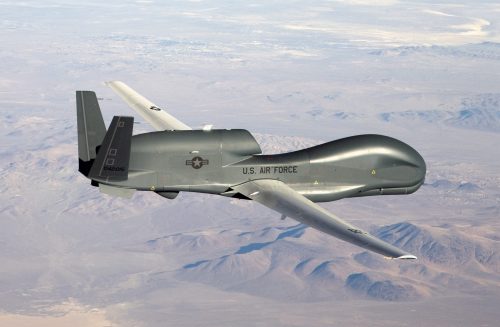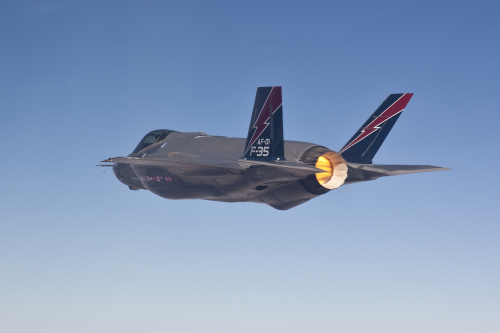
U.S. defense suppliers may increase export prices to make up for weak domestic demand
Washington’s decision to curtail defense spending is expected to affect Seoul’s efforts to acquire stealth fighter jets and spy drones, and sell its homegrown trainer jets to its ally, experts here said Thursday.
The Pentagon unveiled its 2013 budget plan last week with the aim of saving $487 billion over the next decade, as a debt-laden U.S. winds down a decade of war in Iraq and Afghanistan.
It has set a defense budget of $525 billion ― a decrease of $6 billion from the request for the current fiscal year ending in September. The proposal is expected to be submitted to Congress in the middle of this month.
The plan includes a decision to slow the purchase of F-35 fighter jets and cancel the Block 30 Global Hawk spy drone program.
The two aircraft have been cited as strong candidates for Seoul’s acquisition projects designed to better handle North Korea’s asymmetrical military threats and make it fully ready to retake wartime operational control from the U.S. in 2015.
Washington has reportedly decided to postpone its acquisition of 179 F-35 fighters out of the 423 units it initially planned to purchase by 2017.
Experts here have raised the possibility that such belt-tightening by the U.S. could lead to a hike in the aircraft’s price, which could dampen Seoul’s willingness to purchase it.
Under the FX-III acquisition project worth around 8.3 trillion won ($7.42 billion), Seoul is seeking to purchase some 60 next-generation fighters with radar-evading capabilities to be delivered for operational deployment from 2016 through 2021.
“There will be a direct impact on South Korea, which will gradually increase as the U.S. moves to slash defense budgets,” said Kim Jong-dae, editor-in-chief of Defense 21, an online media outlet on military issues.
“Under (financial strain), the U.S. government and the company (Lockheed Martin) may be desperate to boost their overseas sales (to offset a possible decline in the domestic sales).”
Washington’s decision to curtail defense spending is expected to affect Seoul’s efforts to acquire stealth fighter jets and spy drones, and sell its homegrown trainer jets to its ally, experts here said Thursday.
The Pentagon unveiled its 2013 budget plan last week with the aim of saving $487 billion over the next decade, as a debt-laden U.S. winds down a decade of war in Iraq and Afghanistan.
It has set a defense budget of $525 billion ― a decrease of $6 billion from the request for the current fiscal year ending in September. The proposal is expected to be submitted to Congress in the middle of this month.
The plan includes a decision to slow the purchase of F-35 fighter jets and cancel the Block 30 Global Hawk spy drone program.
The two aircraft have been cited as strong candidates for Seoul’s acquisition projects designed to better handle North Korea’s asymmetrical military threats and make it fully ready to retake wartime operational control from the U.S. in 2015.
Washington has reportedly decided to postpone its acquisition of 179 F-35 fighters out of the 423 units it initially planned to purchase by 2017.
Experts here have raised the possibility that such belt-tightening by the U.S. could lead to a hike in the aircraft’s price, which could dampen Seoul’s willingness to purchase it.
Under the FX-III acquisition project worth around 8.3 trillion won ($7.42 billion), Seoul is seeking to purchase some 60 next-generation fighters with radar-evading capabilities to be delivered for operational deployment from 2016 through 2021.
“There will be a direct impact on South Korea, which will gradually increase as the U.S. moves to slash defense budgets,” said Kim Jong-dae, editor-in-chief of Defense 21, an online media outlet on military issues.
“Under (financial strain), the U.S. government and the company (Lockheed Martin) may be desperate to boost their overseas sales (to offset a possible decline in the domestic sales).”

For South Korea’s fighter procurement project, Lockheed Martin’s F-35 is vying with other candidates including Boeing’s F-15 Silent Eagle and the Eurofighter Typhoon made by European Aeronautic Defense and Space Company N.V.
The successful bidder will be determined in October.
In terms of stealth capabilities, the F-35 fighter has been evaluated as more advanced than its rivals as it was designed as a stealth plane from the beginning rather than being retrofitted based on an old platform.
But a widely reported increase in the price and delays in its development have apparently eroded confidence in the multinational F-35 project.
The U.S. military’s initial plan was to secure 2,400 F-35s over the next two decades with a budget of $400 billion. But military observers presume the number will drop with America’s exit from Iraq and expected departure from Afghanistan in 2014.
Despite recent developments on the budget proposal, Lockheed Martin said the price estimate for the F-35 will not be “significantly affected.” It has said that the price of the F-35 to be delivered to Seoul is expected to be around $65 million in 2016.
“The Unit Recurring Flyaway cost of the F-35A (its air force variant) of approximately $65 million is based upon the average price of all aircraft produced over the life of the program, stated in 2011 year economics,” Randy Howard, the company’s director of the Korea F-35 Campaign, told The Korea Herald in an email interview.
“This average cost is not affected significantly by adjustments implemented over a small number of production years.”
The single-seat, single-engine F-35 jet has been co-developed with eight foreign partners ― Britain, Italy, the Netherlands, Turkey, Canada, Australia, Denmark and Norway ― since 2001.
The announcement last week by the Pentagon that it wants to terminate the program for the Global Hawk Block 30, one of Northrop Grumman’s Global Hawk variants, has also triggered concerns over its price increase.
The program is being canceled due primarily to the high cost of purchase and maintenance. Instead, the U.S. has decided to extend the five-decade-old U-2 program.
Seoul has sought to deploy four Global Hawk aircraft by 2015 with a budget of 450 billion won ($398.9 million). It believes the high-altitude, long-endurance aircraft is crucial for keeping tabs on North Korean movements and reducing its reliance on the U.S. for reconnaissance activities, particularly after the OPCON transfer in 2015.
Washington, leading the Foreign Military Sales program, has reportedly doubled its initial price for four of the unmanned aircraft to about 1 trillion won.
Because of the “exorbitant price,” Seoul’s defense acquisition agency has recently decided to carry out an open bidding to allow other platforms to join the competition ― including AeroVironment’s Global Observer and Boeing’s Phantom Eye.
“Seoul has been dithering on whether to buy it because of the high price. When the U.S. government cancels the Block 30 program, and Seoul says it would purchase that, then we have to shoulder part of the development costs,” said Yang Uk, senior research fellow at Korea Defense and Security Forum, a local online media outlet.
Northrop Grumman played down the possibility of a price increase for its aircraft, stressing its ongoing efforts to make it more affordable.
“We do not believe the cancellation of the Block 30 aircraft ― if that actually happens ― would result in a Northrop Grumman price increase for the U.S. Foreign Military Sale of Global Hawk being negotiated between the U.S. government and Korea,” said Lon Rains, director of the company’s Strategic Communications, in an email interview.
The director also stressed that the program has not been officially scrapped as the final congressional decision has yet to come out.
“While we do not predict outcomes on the lengthy budget deliberations, it is not uncommon for Congress to restore cuts to specific programs when approving the final budget,” he said.
Financial challenges facing the U.S. government are also expected to affect Seoul’s efforts to export its T-50 trainer jet.
With technological assistance from Lockheed Martin, Korea Aerospace Industries, the country’s sole aircraft maker, developed the T-50, which has a maximum speed of Mach 1.5 with a maximum range of 800 nautical miles.
The U.S. is by far the largest market for KAI, which hopes to sell at least 350 units to it. But it has deferred its decision on whether to acquire new trainer jets or develop them on its own, or turn their old fighters into trainer aircraft.
The so-called T-X project is expected to be further delayed given the U.S. defense cuts.
Experts have estimated that the global demand for trainer jets and light fighters over the next three decades will amount to around 3,300 units. KAI aims to export around 1,000 units during that period.
“There may be some impact from the U.S. budget reduction on the efforts to sell T-50 overseas as the U.S. is the largest market,” an industry source said, declining to be named.
“But South Korea has actually been eyeing the market for the low-end light attack aircraft as well with the T-50 platform.”
Last December, KAI inked an agreement with Seoul’s Defense Acquisition Program Administration to mass-produce FA-50s based on the T-50 platform, which are expected to replace the aging A-37 and F-5 light attack aircraft.
Yang Uk of the Korea Defense and Security Forum cautioned against expecting too much of the U.S. trainer jet market.
“The war (in Iraq and Afghanistan) is all over now. Thus, the U.S. has no rationale now to demand any increase in defense expenditures,” he said.
KAI has undergone some ups and downs in its overseas sales efforts.
Last May, it signed a $400 million contract with Indonesia to sell 16 T-50s, making Korea the world’s sixth country to export supersonic aircraft. But KAI recently appears to face difficulty entering the Israeli market as the country highly values its long-standing ties with Italy, which seeks to sell its M-346 trainer aircraft.
By Song Sang-ho (sshluck@heraldcorp.com)
-
Articles by Korea Herald












![[Today’s K-pop] BTS pop-up event to come to Seoul](http://res.heraldm.com/phpwas/restmb_idxmake.php?idx=644&simg=/content/image/2024/04/17/20240417050734_0.jpg&u=)





![[KH Explains] Hyundai's full hybrid edge to pay off amid slow transition to pure EVs](http://res.heraldm.com/phpwas/restmb_idxmake.php?idx=652&simg=/content/image/2024/04/18/20240418050645_0.jpg&u=20240419100350)

